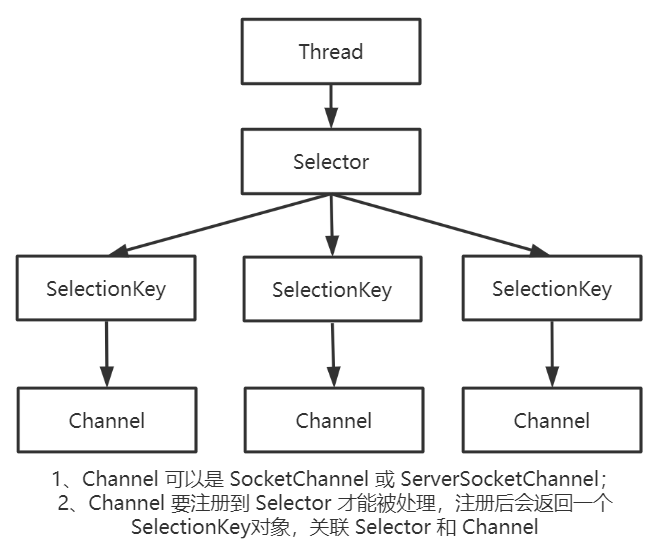You can not select more than 25 topics
Topics must start with a letter or number, can include dashes ('-') and can be up to 35 characters long.
9.0 KiB
9.0 KiB
Selector、SelectionKey 和 Channel 这三个组件构成了 Java nio 包的核心,也是 Reactor 模型在代码层面的体现。Selector 能让单线程同时处理多个客户端 Channel,非常适用于高并发,传输数据量较小的场景。要使用 Selector,首先要将对应的 Channel 及 IO 事件(读、写、连接)注册到 Selector,注册后会产生一个 SelectionKey 对象,用于关联 Selector 和 Channel,及后续的 IO 事件处理。这三者的关系如下图所示。
对 nio 编程不熟的同学可以搜索一些简单的 demo 跑一下,下面 我们直接进入源码,窥探一些 nio 的奥秘。
Selector
其实,不管是 Selector 还是 SelectionKey 的源码,其具体实现类都是依赖于底层操作系统的,这里我们只看一下抽象类 Selector 的源码,日后有事件,再找一些具体的实现类深入分析一下。
public abstract class Selector implements Closeable {
protected Selector() { }
/**
* 获取一个 Selector对象,具体实现依赖于底层操作系统
*/
public static Selector open() throws IOException {
return SelectorProvider.provider().openSelector();
}
/**
* 判断该 Selector 是否已开启
*/
public abstract boolean isOpen();
/**
* 当前所有向Selector注册的Channel 所对应的SelectionKey的集合
*/
public abstract Set<SelectionKey> keys();
/**
* 相关事件已经被 Selector 捕获的 SelectionKey的集合
*/
public abstract Set<SelectionKey> selectedKeys();
/**
* 阻塞到至少有一个通道在你注册的事件上就绪了
*/
public abstract int select() throws IOException;
/**
* 和select()一样,除了最长会阻塞timeout毫秒
*/
public abstract int select(long timeout) throws IOException;
/**
* 此方法执行非阻塞的选择操作,如果自从上一次选择操作后,
* 没有通道变成可选择的,则此方法直接返回 0
*/
public abstract int selectNow() throws IOException;
/**
* 用完Selector后调用其close()方法会关闭该Selector,且使注册到该Selector上的所有SelectionKey实例无效
* 通道本身并不会关闭
*/
public abstract void close() throws IOException;
}
SelectionKey
表示 SelectableChannel 在 Selector 中的注册的标记 / 句柄。
public abstract class SelectionKey {
protected SelectionKey() { }
// -- Channel and selector operations --
/**
* 获取该 SelectionKey 对应的Channel,Channel注册到Selector时会产生该 SelectionKey对象
*/
public abstract SelectableChannel channel();
/**
* 获取该 SelectionKey 对应的 Selector
*/
public abstract Selector selector();
/**
* 该 SelectionKey 是否是有效的
*/
public abstract boolean isValid();
// ------ Operation-set accessors ------
/**
* 获取该 SelectionKey 的兴趣事件 (既 SelectionKey 的4个 事件静态常量)
*/
public abstract int interestOps();
/**
* 设置该 SelectionKey 的兴趣事件
*/
public abstract SelectionKey interestOps(int ops);
/**
* 获取该 SelectionKey 的已操作集
*/
public abstract int readyOps();
// ------ Operation bits and bit-testing convenience methods ------
/**
* channel中的数据是否已经可以读取
*/
public static final int OP_READ = 1 << 0;
/**
* channel是否可以开始写入数据
*/
public static final int OP_WRITE = 1 << 2;
/**
* channel是否已经建立连接
*/
public static final int OP_CONNECT = 1 << 3;
/**
* ServerSocketChannel 是否可以与客户端建立连接
*/
public static final int OP_ACCEPT = 1 << 4;
/**
* channel是否可读
*/
public final boolean isReadable() {
return (readyOps() & OP_READ) != 0;
}
/**
* channel是否可写
*/
public final boolean isWritable() {
return (readyOps() & OP_WRITE) != 0;
}
/**
* channel是否建立连接
*/
public final boolean isConnectable() {
return (readyOps() & OP_CONNECT) != 0;
}
/**
* ServerSocketChannel是否可与客户端channel建立连接
*/
public final boolean isAcceptable() {
return (readyOps() & OP_ACCEPT) != 0;
}
}
Channel 组件
平时编码用的比较多的就是 SocketChannel 和 ServerSocketChannel,而将 Channel 与 Selecor 关联到一起的核心 API 则定义在它们的公共父类 SelectableChannel 中,整个 Channel 组件的核心类图如下所示。
SelectableChannel
public abstract class SelectableChannel extends AbstractInterruptibleChannel implements Channel {
protected SelectableChannel() { }
/**
* 当前channel是否注册到了某个selector上,新创建的channel都是未注册状态
*/
public abstract boolean isRegistered();
/**
* 根据给定的 Selector,获取本channel注册上去的 SelectionKey
*/
public abstract SelectionKey keyFor(Selector sel);
/**
* 将当前channel及关注的事件,注册到Selector上,返回一个 SelectionKey
*/
public final SelectionKey register(Selector sel, int ops) throws ClosedChannelException {
return register(sel, ops, null);
}
public abstract SelectionKey register(Selector sel, int ops, Object att) throws ClosedChannelException;
/**
* 设置该channel的阻塞模式,默认为 true阻塞
*/
public abstract SelectableChannel configureBlocking(boolean block) throws IOException;
/**
* 是否为阻塞IO模式
*/
public abstract boolean isBlocking();
}
ServerSocketChannel
相当于 BIO 中的 ServerSocket,主要用于服务端与客户端建立连接通信的 channel。
public abstract class ServerSocketChannel extends AbstractSelectableChannel implements NetworkChannel {
protected ServerSocketChannel(SelectorProvider provider) {
super(provider);
}
/**
* 获取一个 ServerSocketChannel实例,具体实现依赖底层操作系统
*/
public static ServerSocketChannel open() throws IOException {
return SelectorProvider.provider().openServerSocketChannel();
}
// -- ServerSocket-specific operations --
/**
* 绑定ip地址及要监听的端口
*/
public final ServerSocketChannel bind(SocketAddress local) throws IOException {
return bind(local, 0);
}
public abstract ServerSocketChannel bind(SocketAddress local, int backlog) throws IOException;
/**
* 与一个客户端channel建立连接,返回该客户端的存根 SocketChannel
*/
public abstract SocketChannel accept() throws IOException;
}
SocketChannel
相当于 BIO 中的 Socket,主要用于通信双方的读写操作。
public abstract class SocketChannel extends AbstractSelectableChannel
implements ByteChannel, ScatteringByteChannel, GatheringByteChannel, NetworkChannel {
protected SocketChannel(SelectorProvider provider) {
super(provider);
}
/**
* 根据 SocketAddress 获取一个 SocketChannel,具体实现依赖底层操作系统
*/
public static SocketChannel open(SocketAddress remote) throws IOException {
SocketChannel sc = open();
try {
sc.connect(remote);
} catch (Throwable x) {
try {
sc.close();
} catch (Throwable suppressed) {
x.addSuppressed(suppressed);
}
throw x;
}
assert sc.isConnected();
return sc;
}
public static SocketChannel open() throws IOException {
return SelectorProvider.provider().openSocketChannel();
}
// -- Socket-specific operations --
/**
* 绑定要连接的远程服务的ip及端口
*/
@Override
public abstract SocketChannel bind(SocketAddress local) throws IOException;
/**
* 该channel与服务端是否已连接
*/
public abstract boolean isConnected();
// -- ByteChannel operations --
/**
* 将 channel 中的数据读到 ByteBuffer
*/
public abstract int read(ByteBuffer dst) throws IOException;
public final long read(ByteBuffer[] dsts) throws IOException {
return read(dsts, 0, dsts.length);
}
public abstract long read(ByteBuffer[] dsts, int offset, int length) throws IOException;
/**
* 将 ByteBuffer 中的数据写到 channel
*/
public abstract int write(ByteBuffer src) throws IOException;
public final long write(ByteBuffer[] srcs) throws IOException {
return write(srcs, 0, srcs.length);
}
public abstract long write(ByteBuffer[] srcs, int offset, int length) throws IOException;
}

